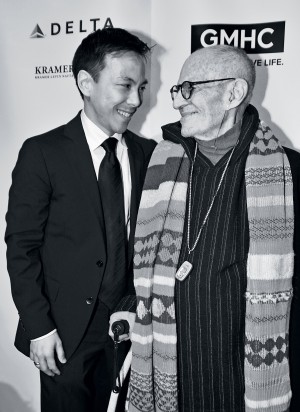
The AIDS epidemic began in 1981, and the very next year, GMHC started a Buddy Program to help those dying from the disease. Buddies escorted clients to the hospital, medical appointments, and shopped for food and other household needs when clients became too weak to leave their homes. At this time, it was not a question of if you were going to die, but when.
Today, thanks to highly active antiretroviral therapy (HAART), HIV is no longer a death sentence and people with HIV are living longer and healthier lives. Long-term survivors are every gender identity and sexual orientation. They are all ethnicities and they all survived the darkest days of the AIDS epidemic with courage and compassion.
At GMHC, we are committed to taking care of our long-term survivors and have a long history of doing so. Every day, we are inspired by the tireless advocacy and tenacity of individuals like Larry Kramer, one of our founders, who celebrated his 81st birthday, and Sean McKenna, who helped revive GMHC’s Buddy Program.
They are all ethnicities and they all survived the darkest days of the AID epidemic with courage and compassion.
GMHC relaunched its Buddy Program in 2015 to ensure that long-term survivors have access to services they require to meet their unique needs. One major difference with the current program is that it’s designed to help people live their lives to the fullest, not prepare them for the end of life. Last year we also started hosting the weekly long-term survivor groups, which provides emotional support for anyone who self-identifies as a long-term survivor.

Kelsey Louie and Larry KramerGMHC
Services & Advocacy for GLBT Elders (SAGE) has come in to train staff on the needs of older adults and creating a more innovative, competitive care environment. On a public policy level, GMHC is working with a coalition of providers from across New York to specifically address the needs of older adults, including long-term survivors, as part of Governor Andrew Cuomo’s plan to end the AIDS epidemic in New York by 2020. And, our advocacy work includes the need for more research that requires ongoing and sustained funding of long-term survivor issues.
The needs of long-term survivors are evolving, which is why GMHC created a committee to examine the programs and services we offer. We believe it is critical to utilize the knowledge and experience of long-term survivors in developing and implementing programs affecting their lives.
As GMHC expands mental health services, we are keeping an eye to long-term survivors who often face isolation; the stresses of living with a chronic disease; elevated risk for depression, substance use, and suicidal ideation; stigma; and symptoms that resemble post-traumatic stress disorder.

Bill Bracker, Psy.D., Vice President, Programs and Clincial Services, GMHCGMHC
Until we find a cure, we will all become long-term survivors. At GMHC, we will continue leading the conversation, providing direct services, sharing stories and best practices, and advocating for policies and funding.
But, we cannot do it alone.
From the September 2016 issue of SeroZero by GMHC. To read the issue as a PDF, click here.







1 Comment
1 Comment